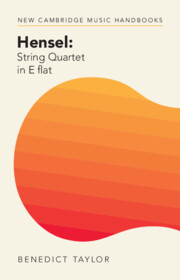Book contents
- Hensel: String Quartet in E flat
- New Cambridge Music Handbooks
- Hensel: String Quartet in E flat
- Copyright page
- Contents
- Figures
- Tables
- Musical Examples
- Preface
- 1 Introduction
- 2 Background
- 3 Genesis and Private Reception
- 4 First Movement
- 5 Second Movement
- 6 Third Movement
- 7 Finale
- 8 Responding to the Quartet
- Select Bibliography
- Index
3 - Genesis and Private Reception
Published online by Cambridge University Press: 07 December 2023
- Hensel: String Quartet in E flat
- New Cambridge Music Handbooks
- Hensel: String Quartet in E flat
- Copyright page
- Contents
- Figures
- Tables
- Musical Examples
- Preface
- 1 Introduction
- 2 Background
- 3 Genesis and Private Reception
- 4 First Movement
- 5 Second Movement
- 6 Third Movement
- 7 Finale
- 8 Responding to the Quartet
- Select Bibliography
- Index
Summary
This chapter outlines the specific compositional genesis of the quartet and its private reception during and immediately following its creation. I first discuss the basis of the quartet in an unfinished piano sonata from 1829, and its compositional process in the early 1830s, before turning to some of the possible motivations for writing a string quartet in this period. The last part of the chapter concerns the somewhat-notorious exchange between Hensel and her brother carried out over the winter of 1834–5. In a letter of 30 January 1835, Mendelssohn offered a critique of the quartet, objecting to Hensel’s use of form, specifically her free use of modulation and music that is in places ‘in no key at all’. Hensel’s response – perhaps unnecessarily deferential – is a revealing acknowledgement of how she felt she remained in thrall to Beethoven’s later music.
Information
- Type
- Chapter
- Information
- Hensel: String Quartet in E flat , pp. 33 - 44Publisher: Cambridge University PressPrint publication year: 2023
